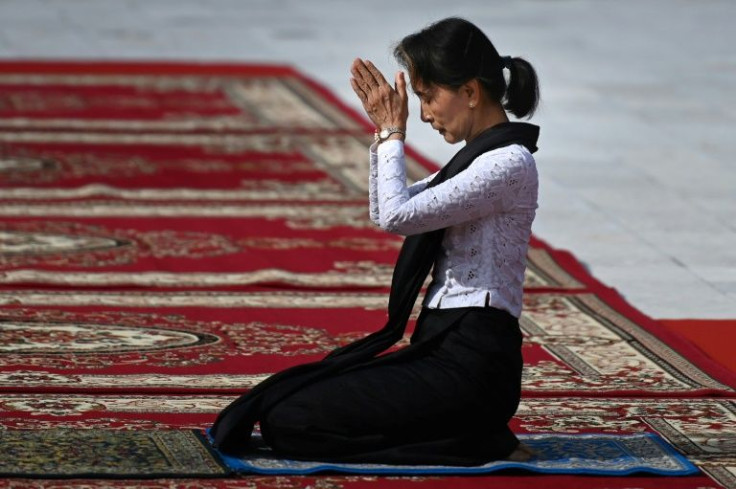The Detention Of Myanmar's Suu Kyi: What We Know
One of the Myanmar military's first moves during its coup last year was to arrest the country's democracy figurehead Aung San Suu Kyi, who has spent decades battling military rule.
The Nobel laureate, 76, has been kept out of the public eye ever since as the junta seeks to crush resistance to its putsch.
AFP takes a look at what we know about Suu Kyi's detention.
Her exact location is unknown. The junta has kept her under house arrest at an undisclosed location in the military-built capital Naypyidaw.
She leaves only to attend hearings for her trial in a special court, which journalists are barred from attending.
Images of the trial have appeared just once, in state-media handouts last year, which showed Suu Kyi sitting behind a low barrier in a plain courtroom alongside co-defendant and ousted former president Win Myint.
The junta has stayed tight-lipped about Suu Kyi's living conditions. It has said she is living with around 10 domestic staff and that she is permitted to read and watch the news from state-backed media.
The junta has rebuffed requests by foreign diplomats to meet Suu Kyi while she is on trial.
Her current isolation is a far cry from the years she spent under house arrest during the previous junta, when she lived at her family's colonial-era lakeside mansion in Yangon and regularly gave speeches to crowds on other side of her garden fence.
Suu Kyi does have her dog Taichido -- gifted to her in 2010 by her UK-born youngest son as he made a rare visit to Myanmar, according to local media -- for company.
The 76-year-old has skipped several trial hearings, leading to concerns over her health as she fights multiple trials.
She missed a hearing in September due to illness, and in October, her lawyer said her health had suffered from her frequent appearances before the junta-run court.

Last year, as Covid cases spiked across Myanmar, the junta announced she had been fully vaccinated, without specifying which dose she had been given.
In March she was briefly quarantined after Covid was detected among her staff and skipped several trial hearings.
Suu Kyi faces a slew of corruption charges and is also on trial for breaching Myanmar's official secrets act and for electoral fraud during 2020 polls her party won in a landslide.
She has already been found guilty and sentenced for illegally importing and possessing walkie talkies, incitement against the military and flouting Covid-19 restrictions.
The junta has said she will serve her jail term under house arrest until her trials are completed.
While her image has been tarnished in the West over her handling of the Rohingya crisis, Suu Kyi remains hugely popular in Myanmar.
In June last year supporters across the country wore flowers in their hair -- long a signature Suu Kyi look -- to mark her 76th birthday.
The junta has gone after her National League for Democracy party -- which trounced a military-backed party in 2020 elections -- with several members jailed or in hiding.
Its election commission is currently investigating the party for alleged elctoral fraud and has threatened to suspend it.
The charges against Suu Kyi -- which rights groups and critics of the military say are concocted -- could see her jailed for more than 150 years.
But the long charge sheet is also a way of "creating elasticity and leeway" while the junta decides what to do with Suu Kyi as it battles pro-democracy fighters, said analyst Soe Myint Aung.
After years under house arrest the military granted her freedom in 2010, just days after elections that her party boycotted but which brought a nominally civilian government to power.
It is unlikely she will be released before elections the junta has said will hold by August 2023 "unless she will serve as an antidote to the popular revolutionary drive or go along with the military-proposed roadmap," the analyst added.
© Copyright AFP 2024. All rights reserved.





















